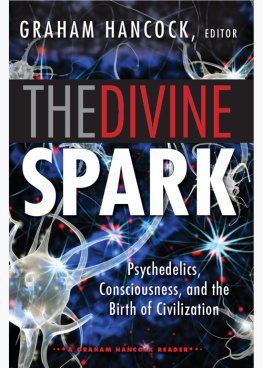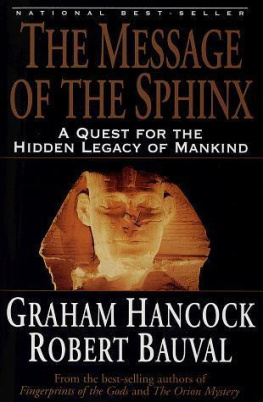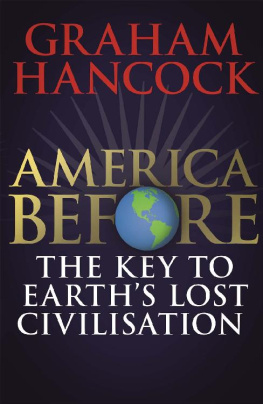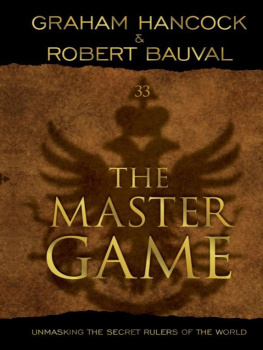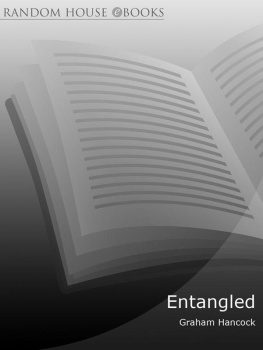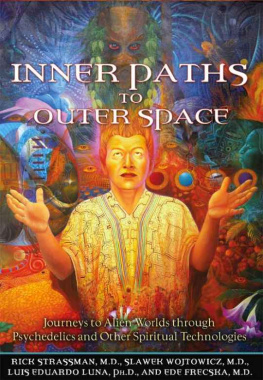
Published by Disinformation Books,
an imprint of Red Wheel/Weiser, LLC
with offices at
665 Third Street, Suite 400
San Francisco, CA 94107
www.redwheelweiser.com
Copyright 2015 by Graham Hancock. All rights reserved. No part of this publication may be reproduced or transmitted in any form or by any means, electronic or mechanical, including photocopying, recording, or by any information storage and retrieval system, without permission in writing from Red Wheel/Weiser, LLC. Reviewers may quote brief passages.
ISBN: 978-1-938875-11-3
Library of Congress Cataloging-in-Publication data available upon request.
Cover and text design by Jim Warner.
Cover photograph xrender / istock.
Printed in the United States of America
EBM
10 9 8 7 6 5 4 3 2 1
Disinformation is a registered trademark of The Disinformation Company Ltd.
www.redwheelweiser.com
www.redwheelweiser.com/newsletter
CONTENTS
INTRODUCTION
BY GRAHAM HANCOCK
I've been very lucky; I feel I've been blessed; I've lived a blessed life. I'm grateful to the universe for giving me the chance to live this life.
But why am I here? Why are you here? Why are we all here on planet earth? Why are we conscious? What are our lives for?
In answer to such questions, I can't offer any facts. I can only give you my view, which is that this world is a theatre of experience and that consciousness is fundamentally nonphysical and one of the driving forces of the universe like gravity or electricity. My guess is that consciousness has chosen to manifest in physical form and perhaps has invested in a very long process of manifestation on the eartha four-and-a-half-billion-year process using evolution.
So... I'm not against evolution. Evolution is obvious. It's a fact. It's there. But the fact that it's there gets over-interpreted. It gets loaded down with a lot of baggage that it shouldn't really be carrying. For example, materialist scientist Richard Dawkins, author of The Selfish Gene, goes so far as to claim that the existence of evolution proves that there's no transcendental meaning to life, that there's no such thing as spirit, that consciousness cannot survive physical deathand so on and so forth.
What Dawkins doesn't consider is the possibility that the spirit world (for lack of a better phrase) has used evolution to manifest physical entities in which consciousness can emerge and express itself and learn lessons. What he doesn't consider, in other words, is the possibility that consciousness comes first while physical realms and beings are manifestations or projections of that primordial consciousnessas above, so below, as many ancient wisdom traditions state.
According to these traditions, the world is indeed a theatre of experience and we find ourselves on its stage in order to learn lessons that can only be taught in a physical realm. Moreover, we are enjoined to be aware that we have been given a precious opportunity to be born into this world of matter and consequences as human beings (rather than as fruit flies, or slime molds, or cockroaches, or stones). After all, the whole biosphere is here to support us. Four billion years of evolution on earth have led us to a point where we can make very fine distinctions between good and evil, darkness and light, love and fearwhere we can make conscious choices that will impact us and others in profound ways.
This is why, in my view, modern technological society can only be described as demonic. It appears to have been expressly engineered to switch people off to the wider implications, and the wider mystery, of being alive. It bombards our consciousness with sterile, soulless messages of production and consumption, of envy and greed, that never get to the fundamentals of anything. It seeks to convince us that we're just meatjust accidents of physics and chemistrythat our only purpose is to produce and consume as much as possible, and that when we're dead, we're dead and that's the end.
I don't believe those messages! I think we're part of a very long journeyand that we may manifest in human form many times upon this earth. Reincarnation makes perfect sense to me precisely because I don't see consciousness as a mere epiphenomenon of brain activity, as a man like Richard Dawkins must, but as the true source of all created things.
I am not alone in this intuition of the primacy of consciousness; indeed, it is shared by all the contributors to this volume and, I suspect, in various guises, by a great many others, all around the world, who have successfully resisted the mental virus mind-programming of modern technological society. But how to take that resistance further? How, if we are beings of consciousness, are we to attempt to penetrate the mystery of consciousness itself and perhaps even discover who or what we really are and why we're here?
At the level of scientific research, I'm not sure how much further scope there is for physical probing of the brain, whether directly through surgical procedures or dissection, or indirectly by means of CT scans, MRI scans, PET scans, intracranial electrophysiology, and so on and so forth. Yes, we can compare healthy and diseased brains, and we can map brains and arrive at fairly definite conclusions about the functions of different brain areas, and we can even digitally reconstruct neurons, but I suspect the real breakthroughs in our understanding of consciousness are going to come from an entirely different direction.
That direction, controversially, has to do with psychedelicswhich, as many of the contributors to The Divine Spark argue, offer spectacular potential for the investigation of the hard problem of consciousness. After a hiatus of nearly half a century, this potential is again beginning to be explored by sciencealthough as yet only in tentative and limited ways that focus on therapeutic outcomes and that shun the use of psychedelics to explore the deeper mysteries of consciousness. Indeed, even in the therapeutic arena, continuing delays, sidetracking, and shortage of funds are still the norm and arise entirely from the ideology of the mind-programming exercise called the war on drugs that we have been subjected to by our governments since the 1970s and that continues to undermine the most basic values of Western democracy.
SOVEREIGNTY OVER CONSCIOUSNESS
What, after all, is Western civilization all about? What are its greatest achievements and highest aspirations?
It's my guess that most people's replies to these questions would touchbefore all the other splendid achievements of science, literature, technology, and the economyon the nurture and growth of freedom.
Individual freedom.
Including, but not limited to, freedom from the unruly power of monarchs, freedom from the unwarranted intrusions of the state and its agents into our personal lives, freedom from the tyranny of the Church and its Inquisition, freedom from hunger and want, freedom from slavery and servitude, freedom of conscience, freedom of religion, freedom of thought and speech, freedom of assembly, freedom to elect our own leaders, and freedom of sexual orientation.
The list of freedoms we enjoy today that were not enjoyed by our ancestors is indeed a long and impressive one. It is therefore exceedingly strange that Western civilization in the 21st century enjoys no real freedom of consciousness.
There can be no more intimate and elemental part of the individual than his or her own consciousness. At the deepest level, our consciousness is what we areto the extent that if we are not sovereign over our own consciousness, then we cannot in any meaningful sense be sovereign over anything else either. So it has to be highly significant that, far from encouraging freedom of consciousness, our societies in fact violently deny our right to sovereignty in this intensely personal area and have effectively outlawed all states of consciousness other than those on a very narrowly defined and officially approved list. The war on drugs has thus unexpectedly succeeded in engineering a stark reversal of the true direction of Western history by empowering faceless bureaucratic authorities to send armed agents to break into our homes, arrest us, throw us into prison, and deprive us of our income and reputation simply because we wish to explore the sometimes radical, though always temporary, alterations in
Next page
